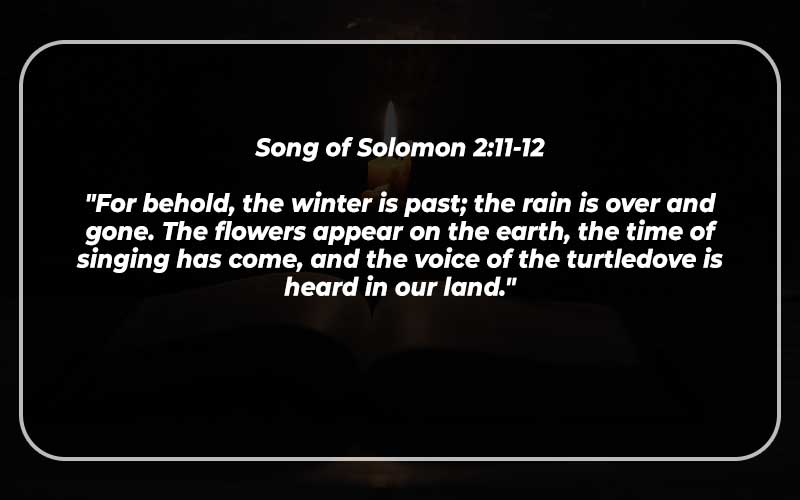As the seasons change, the arrival of spring brings forth a vibrant display of renewal, growth, and the beauty of God’s creation. The Bible, too, is filled with verses that reflect the themes of spring—rebirth, new beginnings, and the promise of life.
In this compilation, we explore 30 Spring Bible Verses, each accompanied by commentary, to celebrate the spiritual significance of this season and the timeless truths found in the Scriptures.
Spring Bible Verses
Song of Solomon 2:11-12
“For behold, the winter is past; the rain is over and gone. The flowers appear on the earth, the time of singing has come, and the voice of the turtledove is heard in our land.”
The Song of Solomon beautifully captures the imagery of spring, portraying a season of transition from winter’s dormancy to the vibrant awakening of nature.
Psalm 104:30
“When you send forth your Spirit, they are created, and you renew the face of the ground.”
This verse from Psalms acknowledges God as the source of renewal, attributing the changing seasons and the flourishing of the earth to His creative power.
Ecclesiastes 3:1-2
“For everything there is a season, and a time for every matter under heaven: a time to be born, and a time to die; a time to plant, and a time to pluck up what is planted.”
Ecclesiastes encapsulates the rhythmic nature of life, including the cyclical pattern of planting and harvesting—a theme resonant with the essence of spring.
Isaiah 43:19
“Behold, I am doing a new thing; now it springs forth, do you not perceive it? I will make a way in the wilderness and rivers in the desert.”
Isaiah’s prophetic words convey God’s ability to bring about newness, even in seemingly barren or desolate places—a promise akin to the transformative spirit of spring.
Psalm 65:9-10
“You visit the earth and water it; you greatly enrich it; the river of God is full of water; you provide their grain, for so you have prepared it.”
The psalmist paints a picture of God’s abundant provision for the earth, correlating the imagery with the season of spring and the bountiful growth it brings.
James 1:17
“Every good gift and every perfect gift is from above, coming down from the Father of lights, with whom there is no variation or shadow due to change.”
James emphasizes the constancy of God’s goodness, reinforcing the idea that the changing seasons are a reflection of His unchanging character.
Genesis 8:22
“While the earth remains, seedtime and harvest, cold and heat, summer and winter, day and night, shall not cease.”
God’s covenant with Noah ensures the perpetuity of seasons, including the promise of spring and the continuity of life’s cycles.
Psalm 92:12-14
“The righteous flourish like the palm tree and grow like a cedar in Lebanon. They are planted in the house of the Lord; they flourish in the courts of our God. They still bear fruit in old age; they are ever full of sap and green.”
This psalm draws a vivid analogy between the flourishing of the righteous and the enduring vitality seen in the evergreen imagery of spring.
Jeremiah 31:12
“They shall come and sing aloud on the height of Zion, and they shall be radiant over the goodness of the Lord, over the grain, the wine, and the oil, and over the young of the flock and the herd; their life shall be like a watered garden, and they shall languish no more.”
Jeremiah envisions a scene of joy and abundance, likening the believers’ lives to a watered garden—a metaphor rich with the imagery of spring.
Matthew 6:28-29
“And why are you anxious about clothing? Consider the lilies of the field, how they grow: they neither toil nor spin, yet I tell you, even Solomon in all his glory was not arrayed like one of these.”
In this passage from the Sermon on the Mount, Jesus encourages His followers to reflect on the beauty and simplicity of God’s creation, using the lilies as a poignant example.
Psalm 136:25
“He gives food to every creature. His love endures forever.”
Psalm 136 celebrates God’s enduring love, expressed through His provision for all creatures, aligning with the theme of renewal and sustenance associated with spring.

Matthew 13:31-32
“He put another parable before them, saying, ‘The kingdom of heaven is like a grain of mustard seed that a man took and sowed in his field. It is the smallest of all seeds, but when it has grown, it is larger than all the garden plants and becomes a tree, so that the birds of the air come and make nests in its branches.'”
Jesus employs the metaphor of a mustard seed’s growth to illustrate the expansive nature of the kingdom of heaven—an apt analogy for the transformative power of spring.
Job 14:7-9
“For there is hope for a tree, if it be cut down, that it will sprout again, and that its shoots will not cease. Though its root grow old in the earth, and its stump die in the soil, yet at the scent of water it will bud and put out branches like a young plant.”
Job’s reflections on hope and renewal are poetically expressed through the imagery of a tree’s ability to sprout again, reminiscent of the vitality seen in spring.
Luke 12:27
“Consider the lilies, how they grow: they neither toil nor spin, yet I tell you, even Solomon in all his glory was not arrayed like one of these.”
This repetition of Jesus’ words emphasizes the simplicity and beauty found in the lilies, reinforcing the theme of God’s care for His creation.
2 Corinthians 5:17
“Therefore, if anyone is in Christ, he is a new creation. The old has passed away; behold, the new has come.”
Paul’s words to the Corinthians echo the themes of renewal and new beginnings, aligning with the transformative spirit of spring.
Psalm 19:1
“The heavens declare the glory of God, and the sky above proclaims his handiwork.”
The psalmist marvels at the magnificence of God’s creation, encouraging believers to see His glory displayed in the wonders of the natural world, especially during the season of spring.
Matthew 24:32-33
“From the fig tree learn its lesson: as soon as its branch becomes tender and puts out its leaves, you know that summer is near. So also, when you see all these things, you know that he is near, at the very gates.”
Jesus uses the analogy of a fig tree’s tender branches as a lesson in discerning the signs of the times, drawing a parallel to the seasonal awareness observed in spring.
Isaiah 55:10-11
“For as the rain and the snow come down from heaven and do not return there but water the earth, making it bring forth and sprout, giving seed to the sower and bread to the eater, so shall my word be that goes out from my mouth; it shall not return to me empty, but it shall accomplish that which I purpose, and shall succeed in the thing for which I sent it.”
Isaiah draws a parallel between the life-giving nature of rain and snow on the earth and the efficacy of God’s Word in accomplishing His purposes—a theme reflective of the spiritual growth witnessed in spring.
Psalm 104:24-30
“O Lord, how manifold are your works! In wisdom have you made them all; the earth is full of your creatures. Here is the sea, great and wide, which teems with creatures innumerable, living things both small and great. There go the ships, and Leviathan, which you formed to play in it. These all look to you, to give them their food in due season. When you give it to them, they gather it up; when you open your hand, they are filled with good things.”
This passage from Psalm 104 reflects on the vastness of God’s creation, emphasizing His providential care for all living things—a theme that resonates with the awakening of nature in spring.
1 Corinthians 15:35-38
“But someone will ask, ‘How are the dead raised? With what kind of body do they come?’ You foolish person! What you sow does not come to life unless it dies. And what you sow is not the body that is to be, but a bare kernel, perhaps of wheat or of some other grain. But God gives it a body as he has chosen, and to each kind of seed its own body.”
Paul uses the analogy of planting and growth to illustrate the concept of resurrection and transformation, drawing a parallel to the processes observed in spring.
Psalm 51:10
“Create in me a clean heart, O God, and renew a right spirit within me.”
King David’s prayer for a clean heart and a renewed spirit reflects the theme of personal renewal and transformation—a spiritual parallel to the rejuvenation witnessed in spring.

